| 2014 Q4 | story by KATHERINE DIAZ | photos by STEVEN HERTZOG |
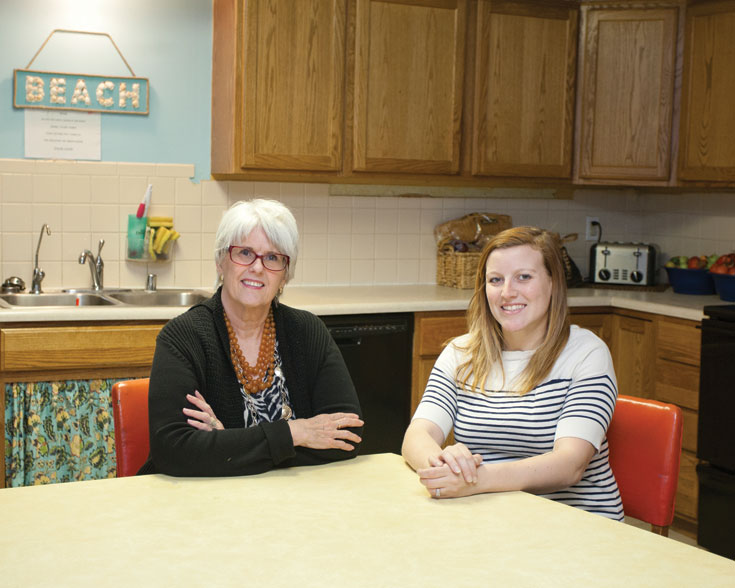
Executive Director of Willow Joan Shultz with the Director of Survivor Services Anna Van Schoelandt
Janet Dehnert is as busy today as she was when she retired, if not more. As head of the fundraising committee board member and a volunteer advocate, Dehnert strives each day to improve the lives of women and children who fall victims to domestic violence.
“Whether you know it or not, everyone knows someone who has been in an abusive situation,” Dehnert said. “It’s one in every three women, and one in every seven men. So, chances are you’ve known someone.”
The Willow Domestic Violence Center provides safety and shelter to those seeking refuge from a violent experience. It was established in 1976, and was the first domestic violence shelter created in Kansas. Willow was formed from a grassroots movement of students and community members from the feminist movement of the 1960s, according to Executive Director of Willow, Joan Shultz.
Domestic violence is often a topic that is overlooked and kept hidden. However, through community education, Shultz is determined to bring to light this neglected issue and make it a topic for discussion.
“Historically, domestic violence is hidden and in the shadows because that’s where abusers work best,” Shultz said. “We’re trying to get the community to talk about it, and that will give victims of domestic violence the awareness to come forward when this [violence]is happening.”
In order to assist these individuals who do seek help, Willow has formed a solid volunteer program of approximately 70 people, according to Shultz. This number also includes Dehnert, and as an active volunteer for the past two years, assists with a variety of tasks both at the shelter and outside services. Some of her responsibilities at the confidential location include ensuring supplies are in stock, women at the shelter are fulfilling their assigned chores and overall making sure tasks are in good order. On the other hand, Dehnert’s non-shelter duties consist of providing information to the public and increasing advocacy for domestic violence in the community. Dehnert’s commitments have been rewarding as she sees the impact she’s made in the lives of survivors, which continues to be her motivation to help those in need of shelter and guidance.
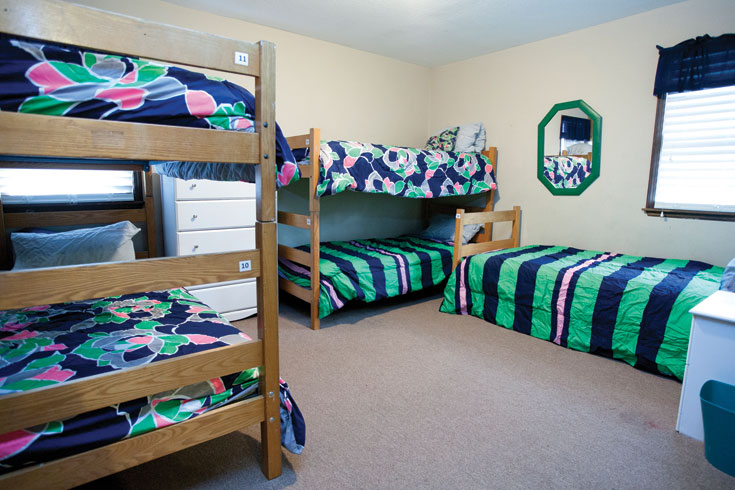
Dehnert has started a capital campaign to pay off the mortgage on the shelter.
“One of the most touching experiences was [when]a woman in the shelter recognized all the work that was done in that shelter on behalf of the women [survivors],” Dehnert said. “She made a handmade thank you card, out of construction paper and art materials we have at the shelter, for every single volunteer and staff member.”
For Dehnert, stories like this, in which people arrive at the shelter scared and devastated, leave more confident and are able to take on the challenges they’re facing, inspire her to continue her advocacy work at Willow.
“Willow is just a great organization,” Dehnert said, summing up her overall thoughts about the non-profit entity.
Willow offers a variety of programs, which includes educational and informational services. One being the S.A.F.E. teen dating violence program that aims at educating adolescents, parents and faculty members about healthy relationships. The program emphasizes ways of detecting the red flags in a violent, abusive relationship that can harm a victim physically and emotionally.
“The most dangerous time for a woman in her lifetime [occurs]three times: between the age of 16 and 24, when she is pregnant and when they leave an abusive relationship,” Shultz said. “Those are the most lethal times.”
The S.A.F.E. program’s goal is to teach teens the importance of healthy dating relationships, so they will be able to recognize and combat potential harm early on. This program also reflects Shultz’s goal to bring into discussion the sensitive topic of domestic violence in the community.
Another service provided by Willow is the Court Advocacy program that assists individuals with the protection from abuse order process. Though Willow is not an organization that staffs attorneys, volunteers serve as peer councilors and help victims fill out the order form, according to Shultz. Another aspect of the program is to provide support to survivors during court proceedings.
“When you have to stand up in court and your abuser is six or seven feet away from you, you need some support, and that is what we provide through our court advocacy,” Shultz said.
For women and children who suffer from domestic violence and seek asylum at Willow, Shultz is quick to acknowledge that these families are not yet out of harms way. “Are you safe?” survivors are asked when seeking aid from Willow, followed by the question, “What do you want to do?” According to Shultz, many times victims of domestic violence are told what to do, what to wear and how to talk. At The Willow, Shultz and volunteers attempt to empower these individuals to think about they want to do.
“We want all our survivors to take away from Willow, a renewed sense of hope and a sense of self,” Shultz said.
For Shultz, one unintended consequence that occurred from providing valuable support and resources is the renewed sense of community that survivors gain from Willow.
“They see that their community has cared and once they get back on their feet, and they’re healthy again, they’re able to engage more by giving back or just by being within the community,” Shultz said, also adding that domestic violence is very isolating and through Willow’s programs and assistance, victims gain a larger sense of belonging.
Women are often the subjects in domestic violence cases, but children are also victims and can suffer psychologically and, at times, physically. What Willow has done to aid these young survivors is provide them with various child services, such as art programs and music therapy.
“Children experiencing domestic violence need to be able to have a safe place to talk about it. Sometimes they need a place to talk about it amongst themselves, and that happens in the children’s program and it also happens in the art program,” Shultz said. “When you’re working with your hands, children tend to talk amongst themselves, and some of those conversations are absolutely heart-wrenching.”
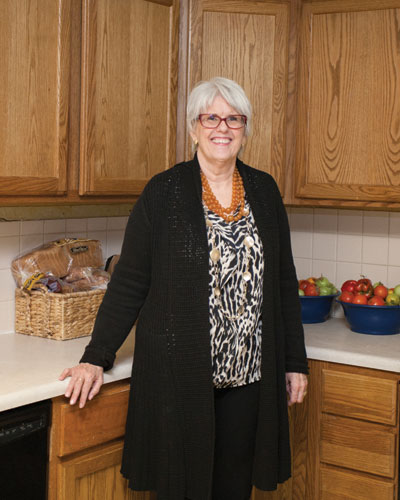
Joan Shultz
Although more women and children experience domestic violence, men also fall victims to this abuse. Willow more than recognizes this fact, as its services are also available to men. Dehnert stated that she has met with men who’ve been victims of abuse, and listened to their stories. Currently, Willow provides non-shelter services to men; however, there is a need in the community to accommodate men seeking refuge, according to Dehnert. For now, male victims are provided information and are able to meet with an advocate in the community to talk about their experiences.
One way to address the limited shelter assistance for men is with the recently launched capital campaign started by Dehnert. The campaign is to initially pay off the mortgage on the Willow shelter, which will then allow for future financial flexibility. Therefore, Willow will be able to expand its direct services, which, according to Dehnert, are greatly needed.
“Court advocacy is in great demand, and we do want to expand our services [further]to men in the community,” Dehnert said.
This campaign is an opportunity for Willow to grow its advocacy, but it has been a gradual process. Dehnert and the board have been contacting only a certain number of people to start, but Dehnert plans to increase the awareness about the campaign and take one step closer to reaching the ultimate goal.
“We can offer shelter and we can offer help for people who are in the current situation, but our goal is to not be needed,” Dehnert said. “That’s probably never going to happen, but maybe not to be needed so much.”
Being a volunteer advocate, Dehnert strives to see more healthy and happy relationships in the community. The S.A.F.E. program is one approach to address the issue of potentially harmful relationships, as it has the potential to combat future domestic violence. According to Dehnert after the mortgage has been paid, Willow will expand the S.A.F.E. program and it will be presented to every eighth grader in the Lawrence public schools. Domestic violence will be a topic of discussion for those entering the high school dating age, and, for Shultz, this subject is one that should not be neglected.
“I think one thing that’s happened under Joan’s leadership is [that]the word about Willow and the information about Willow has really [become accessible],” Dehnert said, also stating that in the early years, Willow was more confidential. “What comes with that [more accessibility]is more people know about it, but we’ve also seen the number in the shelter and demands for services grow exponentially.”
Dehnert believes this rise is due to the increase in awareness about Willow, as people now know where to call. Also, she says that the culture about domestic violence is opening up in the population and its more willing to talk about the issue. Domestic violence is a topic in which innocent lives are constantly at risk, and not only must victims find the courage to stand up and save themselves and their families, communities also have the responsibility to provide safety for all residents. Willow continues to persevere to fulfill this responsibility, but it also acknowledges the fact that many victims still hide in fear, and that there are just as many individuals that have lost their lives to this violence.
“One murder occurs every 14 days,” Shultz said. “That’s quite a statistic.”
In order to combat this factor, Willow is prepared to provide aid to anyone seeking it, and continues to fulfill its mission to “restore the health and safety of survivors of domestic violence by providing safety, education, and advocacy in Douglas, Franklin, and Jefferson Counties.”

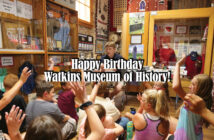

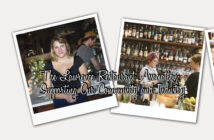
42 Comments
Thanks a lot for the blog.Really thank you! Awesome.
how to get propecia – do propecia pills expire finasteride before after
Enjoyed every bit of your article post.Thanks Again. Really Cool.
I’d need to verify with you here. Which is not one thing I usually do! I take pleasure in reading a submit that will make individuals think. Additionally, thanks for permitting me to remark!Type Beats
What’s Going down i’m new to this, I stumbled upon this I’ve found It positively useful and it has aided me out loads. I hope to give a contribution & aid different users like its aided me. Great job.
lisinopril ace inhibitor lisinopril muscle pain
A fascinating discussion is worth comment. I believe that you need to write more about this subject matter, it might not be a taboo subject but typically people don’t talk about these topics. To the next! All the best!!
Thank you for another excellent post. Where else may just anyone get that kind of info in such a perfect means of writing? I have a presentation next week, and I’m at the search for such info.
A big thank you for your blog post. Really Great.
Very good blog post.Really looking forward to read more. Fantastic.
Some genuinely excellent information, Gladiolus I noticed this. “True success is overcoming the fear of being unsuccessful.” by Paul Sweeney.
prilosec and kidneys acid reflux omeprazole not working
It’s going to be end of mine day, except before finish I am reading this enormous post to improve my know-how.
Looking forward to reading more. Great post. Will read on…
Superb post but I was wondering if you could write a litte more on this subject? I’d be very thankful if you could elaborate a little bit further. Appreciate it!
Thank you for your article post.Much thanks again.
Good response in return of this difficulty with real arguments and describing everything about that.
Regards, Great stuff!how to write a personal essay for graduate school management term paper press release writing services
Looking forward to reading more. Great article.Really looking forward to read more. Awesome.
Thanks for every other excellent article. The place else may anyone get that kind of info in such an ideal approach of writing? I have a presentation next week, and I’m on the look for such information.
Im obliged for the blog post.Really looking forward to read more. Cool.
Hey! I just want to give an enormous thumbs up for the great data you might have here on this post. I shall be coming back to your blog for extra soon.
I am not sure where you’re getting your info, but good topic.I needs to spend some time learning much more or understanding more.Thanks for wonderful info I was looking for this information for my mission.
This information is very important and you’ll need to know this when you constructor your own photo voltaic panel.
It’s hard to come by knowledgeable people for this topic, however, you sound like you know what you’re talking about! Thanks
Really informative article post.Really looking forward to read more. Fantastic.
Really informative article.Really looking forward to read more. Keep writing.
Heya i am for the first time here. I came across this board andI find It really useful & it helped me out a lot. I hope to give something back andhelp others like you helped me.
Hey, thanks for the blog post.Thanks Again. Fantastic.
need help writing a paperediting services online
Excellent blog you have here.. Itís hard to find excellent writing like yours nowadays. I honestly appreciate people like you! Take care!!
When I originally commented I clicked the “Notify me when new comments are added” checkbox and now each time a comment is added I get three e-mails with the same comment.Is there any way you can remove people from that service?Thanks a lot!
Wow, great blog article.Really looking forward to read more. Great.
Really enjoyed this blog post.Really looking forward to read more. Great.
932361 398935I liked than you may be now. 760731
I really liked your blog.Really looking forward to read more. Much obliged.
I appreciate you sharing this post. Cool.
Very good blog post.Much thanks again. Fantastic.
I am so grateful for your blog.Really thank you! Great.
Im grateful for the article post.Thanks Again.
Thank you ever so for you post.Really thank you! Keep writing.
Thanks so much for the blog.Much thanks again. Want more.